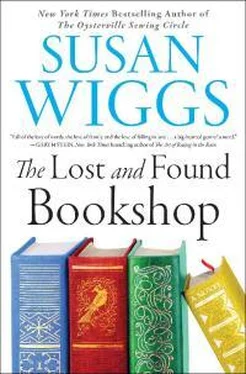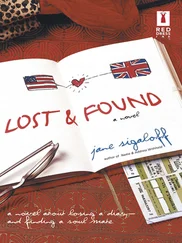After making an inspection of the moldy wall, Peach motioned her over. “I think I found your problem.”
He’d placed a drop cloth on the floor to catch the loose plaster. The exposed horizontal laths spanned the hole like a set of broken ribs. He’d cut away several of the wood strips to reveal a cracked pipe. “There are three things that are the enemies of an old building—human beings, fire, and water. You’ve got some water damage here.”
She inspected the mineral-crusted pipe. “A leak,” she said. “I suppose that’s bad.”
“Definitely not good.”
“Do I need to call a plumber?”
He shot her a wounded look. “Please.” He stuck his hand into the wall and groped around. “I’ll need to find a shut-off valve. You might have to do without water while I investigate. Could be— Hello. ”
“Now what?” She leaned over his shoulder while he groped around some more.
“There’s something else in here.”
She took a step back. “Is it alive?”
“You do seem to have a rat problem.”
“How can I have a rat problem? I have a cat.” She shot a glance at Sylvia. “Lazy old thing.”
Peach loosened more plaster to reveal a gap in the laths. “I can put out some bait stations, but this is something else.” Reaching deeper, he pulled out a long, flat metal box and set it on the drop cloth. “What do you suppose that is?”
The box was covered in plaster dust and cobwebs. It had latches on each end and rusty hinges along the back. Flaking stenciled letters spelled out Woodruff’s Celebrated Healing Ointment, and someone had scratched A. Larrabee in one corner of the metal.
“No idea,” Natalie said. “I wonder what a box was doing in the wall.”
“How old is this place, do you know?”
“Dates back to the gold rush days.”
“Maybe it’s buried treasure.”
“That would be nice.”
“Let’s have a look, then.” He pried open the latches and squirted the hinges with oil. The top flipped up, raining flakes of corroding metal and paint and revealing a collection of objects.
They both leaned forward to peer at the odds and ends—faded photos, buttons, a monocle, some keys and old ribbons. “Ancient mementos,” said Natalie. “These look like medals. War medals?” She held one up. It was heavily tarnished, but she could make out a couple of the words. War with Spain. Philippine Insurrection . Then she grabbed her phone and sent a picture to Tess. “One of my friends is an antiquities expert. I bet she can find out more information.”
There was a faded postcard depicting a bay of some sort. A printed description identified it as the Old Gateway. Someone had written a note on the card, but the ink was too washed out to decipher.
“That must be Manila,” said Peach. “The Americans destroyed a Spanish fleet there in 1898.”
She looked at him in surprise. “You just had that on the tip of your tongue?”
He shrugged. “I know stuff. Sometimes.”
She was embarrassingly ignorant of the Spanish-American War, not to mention an insurrection in the Philippines, which she knew was related but didn’t know how. Her phone pinged her. “You were right. Tess says it’s a medal from the Spanish-American War. She wants the serial number on the edge.” Natalie picked up the medal and squinted, trying to make out the tiny numbers. Peach rummaged for something in his tool belt and handed her a polishing cloth. She caught his scent of rain and motor oil, which she found oddly appealing. Unsettled, she moved away from him and used the monocle to magnify the print on the medal.
She sent the numbers to Tess. A brittle, yellowed newspaper clipping lined the bottom of the box—an article from the Examiner . She sat back on her heels. “I wonder why someone would hide these things in the wall.”
“It wasn’t an uncommon practice,” said Grandy, shuffling into the room.
Startled, Natalie got to her feet. “Good morning,” she said, giving him a quick hug. “I didn’t hear you get up.” She introduced him to Peach, hoping her grandfather was having a good day. She never knew if he would be with her, or if he would mentally wander off to places she couldn’t follow.
“Peach?” Grandy studied him. “A nickname, I assume.”
“My given name is Peter. I grew up in Georgia, and when I was in the Marines, the name stuck.”
“I see. Well, then. Thank you for your service.”
In one exchange, her grandfather had already learned more about the guy than Natalie had. Maybe her mother was right. Maybe she was too closed off from people instead of extending herself and inviting them in. She thought she’d done that with Rick, yet they’d hit a dead end.
Dead end , she thought. You’re a horrible person, Natalie Harper.
“. . . a while ago,” Peach was telling Grandy. “I got to see the world when I was in the service.”
With the ponytail and pirate earring, he didn’t look like a marine at all, Natalie observed. He looked . . . She shut down the errant thought. She shifted focus and turned to Grandy. “So you know something about things hidden in the walls?” She brought the old box over to the coffee area, placing it on a table while she fixed him a coffee.
He offered a vague, sweet smile. The morning light played softly across his features and his neatly combed white hair. He had always paid attention to his grooming. Maybe this meant he was having a good day. Natalie had been dreading the day when he would be broken beyond repair, a day the books she’d been reading said would inevitably come.
Please, not today , she thought.
“Soldiers who had no home needed a place to leave their keepsakes when they were being shipped out, so they sometimes hid things in the walls of their favorite haunts.”
“Well, that’s remarkable. I had no idea.” She wondered what her mother would have said about the false cupboards and artifacts. She wished Mom were here to talk to. One of the most alarming things about losing her so suddenly was that Natalie questioned her own recall. Had she listened closely enough? Filed the memories away like digital documents?
“This building started out as a public house,” Grandy said. “We think the counter there was once the bar. Actually, this place was originally a saloon with a brothel upstairs.”
“You don’t say.” Peach looked around, taking in the high ceiling of hammered tin, the wainscoting with its many coats of paint, and the rolling ladder for reaching the top shelves.
“It’s referred to as a boardinghouse in old county records. And of course, ‘boardinghouse’ was a code word for brothel. It was nicknamed the Ten-Foot Ladder. Apparently that was the way some dandies accessed the upper floors if they didn’t want to be seen. I’ve always thought the rooms upstairs are so small because it was a brothel. All that was needed was a bed and a washstand and a hook to hang your hat on.”
Natalie looked around the shop, trying to imagine an old-time bar and the goings-on upstairs. “I was a kid when you first told me about that,” she said. “I pictured women lined up like books on a shelf. It was a bit confusing. And gross.” To Peach, she said, “In the historical register, it’s listed as the Sunrose Building. There’s an ornament at the roofline.”
Andrew went on, “My father told me about the saloon. His mother, Colleen, worked as a chambermaid and had rooms in the basement. He never mentioned the brothel. Blythe and I found that out later.” He took an unhurried sip of his coffee. “Where is Blythe this morning?”
Natalie winced. She felt Peach watching her. “Grandy, she’s gone.”
“Gone where?” He blinked, his expression mild with bewilderment.
Читать дальше












